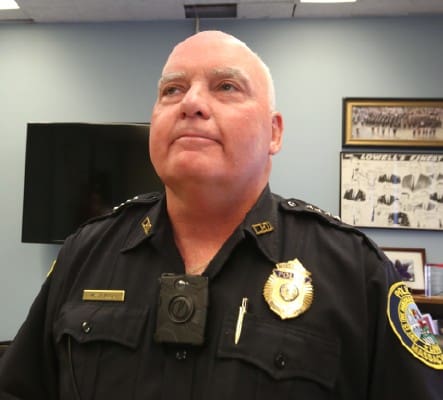The Truth About Concealed Carry Licensing Laws
“A security guard wants to protect himself and improve his job prospects by being able to apply for positions as an armed security guard,” lowellsun.com reports. “A store owner wants to feel safe from the threat of robbery. They’re among four city residents — three male, one female — who have applied to the Lowell [Massachusetts] Police Department — and received — an unrestricted license to carry a firearm in public. The approvals are the first since the department earlier this year updated its gun policy, adding two controversial requirements: applicants must take a safety course and submit a ‘written supplement’ — or essay — explaining the reason(s) for seeking the license.” You ready for this? Here are The Sun’s summaries of the four concealed carry applicants’ essays . . .
A security guard who is a father of two young children wrote, “We do not live in the safest part of the city.” After citing crime statistics for Lowell and his Second Amendment right to bear arms, he added, “I strongly believe that being a responsible gun owner is a responsibility and a priority; firearms safety is not only a precaution but a way of life.”
A small business owner, citing news reports about robberies at stores like his, wrote he fears being robbed, adding that carrying a firearm will enable him to worry less and focus more on expanding his business. “My first defense is always to try and safely remove myself then reach for another form of defense like pepper spray before my firearm, but the option needs to be my decision to make in society,” he wrote.
A woman who moved to Lowell from Chelmsford, where she had a longtime unrestricted license, wrote, “I have had a permit for 10 years without any violations. I am a mandated reporter and extremely experienced in de-escalation techniques and have also taken self-defense classes.”
A person who was the victim of violent crime and works with city youths wrote he’s never been arrested and doesn’t drink alcohol, use drugs, or smoke cigarettes. He stressed safety and personal protection.
In the first example, a security guard assumes that Lowell Police Superintendent William Taylor [above] considers the guard’s right to keep and bear arms dependent on the applicant’s local crime rate. Consider the obverse of his argument: if a concealed carry applicant lives in a “good” neighborhood, he or she sacrifice their right to armed self-defense.
In the second example, a small business owner stresses his deference to his Massachusetts’ “duty to retreat” law (the ridiculous requirement that citizens must seek to retreat and/or run from a life-threatening attack before he or she can use deadly force). A gun will give him peace of mind, which will help him expand his business and generate more tax revenue (presumably).
In the third example, the female applicant insists she’s been a good girl — with an unrestricted license! — for ten years. You know; before she moved towns and lost her right to bear arms. More than that, she’s got mad skillz for stopping bad guys without resorting to perp perforation.
In the fourth example, the applicant feels obliged to tell Lowell’s concealed carry gatekeeper that he doesn’t smoke cigarettes. I know the Bay State is as PC as they come, but has it got to the point where citizens feel that smokers have fewer Constitutional rights than non-smokers?
When I lived in Rhode Island, I faced an even more “comprehensive” process to obtain the state’s permission to carry a firearm. In addition to training, fingerprinting, a criminal background check, an application fee and notarized recommendations from three people who knew me, the municipal permitting authority required an essay on my reasons for applying for a concealed carry license.
Before I wrote my essay, I accompanied a friend on his rent collection rounds — to establish the “fact” that I regularly carried large amounts of cash in bad neighborhoods. I joined a local pistol club (in a bad part of town) and travelled hither and yon with a friend who bought and sold firearms — to establish the “fact” that I was the target of a potential gun grab. All that to bolster other arguments that I was “special” (e.g., documented threats against my life).
The officer in charge of Providence’s concealed carry license applicants interviewed my referees. One day, seven months beyond the legally required processing time, he showed up at my door for a face-to-face interrogation. The first words out of his mouth: “I don’t want to hear anything about the Second Amendment.”
Texas is far from perfect when it comes to firearms freedom. The Lone Star State imposes a licensing system for residents seeking to exercise their natural, civil and Constitutionally protected right to bear arms.
But at least I didn’t have to prove my “need” to carry. At least my application wasn’t subject to the whims of a single individual — holding my rights in their hand like a mother holding candy, demanding her child make the bed (properly!), do the dishes (all of them!), finish their homework (show it to me!) and tell her how much they love her (say it like you mean it!) before grudgingly handing over the reward.
Truth be told, gun control reflects the wider infantilization of America. By conditioning Americans to beg for their birthright, licensing laws perpetuate this dysfunctional dependency. Equally, concealed carry licensing is a fundamentally degrading process. Humiliating. You might even say perverted. Get off your knees America! That’s all I have to say about that.
55
You need to be a member of 12160 Social Network to add comments!
Join 12160 Social Network